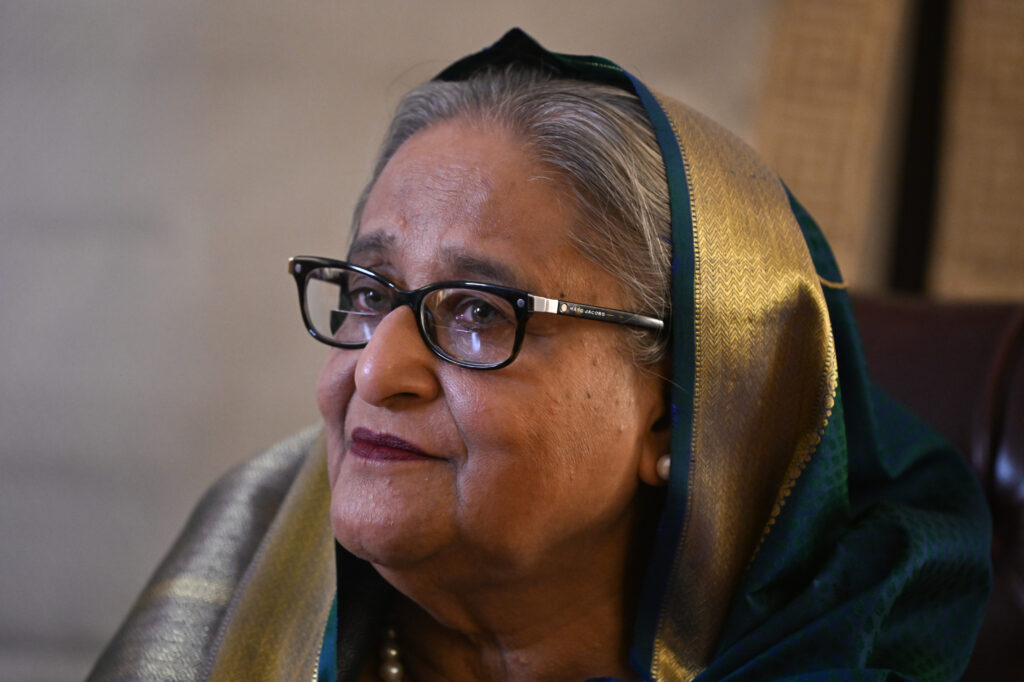Audio recordings analysed by the BBC suggest Bangladesh’s fugitive ex-prime minister Sheikh Hasina ordered a deadly crackdown on protests last year, allegations for which she is on trial.Up to 1,400 people were killed between July and August 2024, according to the United Nations, when Hasina’s government ordered a crackdown on protesters in a failed bid to cling to power.Hasina, 77, fled to India at the culmination of the student-led uprising and has defied orders to return to Dhaka, where her trial in absentia for charges amounting to crimes against humanity opened on June 1.The BBC Eye Investigations team analysed audio alleged to be of Hasina — and which forms a key plank of the evidence for the prosecution — which was leaked online.In the recording, dated July 18, 2024, a voice alleged to be Hasina is heard authorising security forces to “use lethal weapons” against protesters and that “wherever they find (them), they will shoot”.The BBC said audio forensics experts had found no evidence that the speech had been edited or manipulated, and that it was “highly unlikely to have been synthetically generated”.Bangladesh police have also matched the audio with verified recordings of Hasina.- ‘Denies the charges’ -Protests began on July 1, 2024 with university students calling for reforms to a quota system for public sector jobs.Student ambitions to topple Hasina’s iron-fisted rule seemed a fantasy, just months after she won her fourth consecutive election in a vote without genuine opposition.But protests gathered pace, and a fuse was lit when police launched a deadly crackdown on July 16. Hasina’s state-appointed lawyer — who says they have not been in contact with her — have sought to throw out the charges.Her now-banned Awami League party said it “categorically denies the charges that its senior leaders, and the prime minister personally, directed the use of lethal force against crowds during the protests of last summer”. It instead said that “breakdowns in discipline among some members of the security forces on the ground in response to instances of violence led to (a) regrettable loss of life”. Hasina was already convicted of contempt of court in a separate case on July 2, receiving a six-month sentence. She remains in India.
Audio recordings analysed by the BBC suggest Bangladesh’s fugitive ex-prime minister Sheikh Hasina ordered a deadly crackdown on protests last year, allegations for which she is on trial.Up to 1,400 people were killed between July and August 2024, according to the United Nations, when Hasina’s government ordered a crackdown on protesters in a failed bid to cling to power.Hasina, 77, fled to India at the culmination of the student-led uprising and has defied orders to return to Dhaka, where her trial in absentia for charges amounting to crimes against humanity opened on June 1.The BBC Eye Investigations team analysed audio alleged to be of Hasina — and which forms a key plank of the evidence for the prosecution — which was leaked online.In the recording, dated July 18, 2024, a voice alleged to be Hasina is heard authorising security forces to “use lethal weapons” against protesters and that “wherever they find (them), they will shoot”.The BBC said audio forensics experts had found no evidence that the speech had been edited or manipulated, and that it was “highly unlikely to have been synthetically generated”.Bangladesh police have also matched the audio with verified recordings of Hasina.- ‘Denies the charges’ -Protests began on July 1, 2024 with university students calling for reforms to a quota system for public sector jobs.Student ambitions to topple Hasina’s iron-fisted rule seemed a fantasy, just months after she won her fourth consecutive election in a vote without genuine opposition.But protests gathered pace, and a fuse was lit when police launched a deadly crackdown on July 16. Hasina’s state-appointed lawyer — who says they have not been in contact with her — have sought to throw out the charges.Her now-banned Awami League party said it “categorically denies the charges that its senior leaders, and the prime minister personally, directed the use of lethal force against crowds during the protests of last summer”. It instead said that “breakdowns in discipline among some members of the security forces on the ground in response to instances of violence led to (a) regrettable loss of life”. Hasina was already convicted of contempt of court in a separate case on July 2, receiving a six-month sentence. She remains in India.
